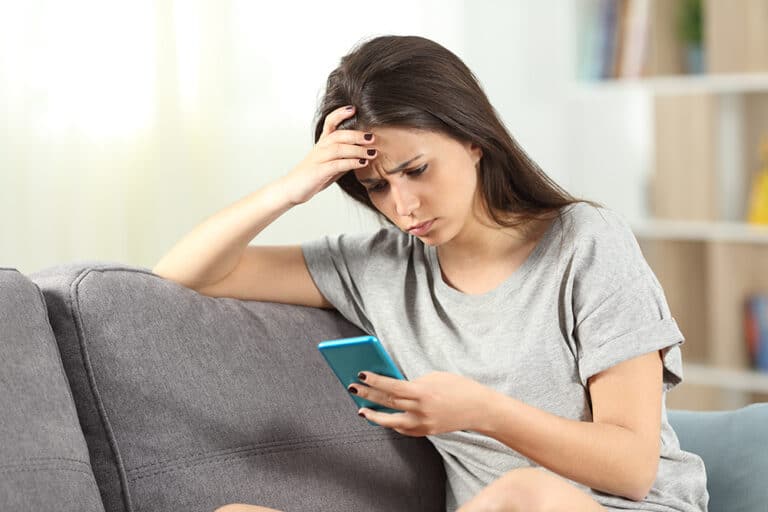Regardless of what you did today on your computer or your phone, it’s likely that social media was involved one way or another.
Four billion people worldwide use social media. Facebook, Twitter, and Instagram have prompted mental health experts to investigate whether the popularity of social media plays a role in depression.
So far, research suggests that those who limit the amount of time spent on social media tend to be happier overall than those who don’t. Studies also indicate that social media can trigger various negative emotions in users that can worsen or contribute to symptoms of depression.
Defining depression
Major depressive disorder, also known as clinical depression, is a mood disorder defined by persistent feelings of sadness and loss of interest in things someone used to enjoy.
Symptoms can be mild or severe and make it challenging for those with the condition to focus, sleep or eat well, make decisions, or manage day-to-day responsibilities.
What are the facts?
With more than half of the world’s entire population active on social media sites, it’s fair to say that social media has never been more popular. Here’s what the research has to say.
- According to a study in 2018, people who are checking Facebook and Instagram late at night are more likely to feel unhappy and depressed.
- Another study from 2018 found that the fewer time people spent on social media, the more minor symptoms of loneliness and depression they experienced.
- A 2015 examination found that Facebook users who felt envious while scrolling on the networking site were more likely to experience symptoms of depression and loneliness.
Generally speaking, they found that if you use less social media, you’re less lonely and depressed overall. This means that decreased social media usage is what causes a significant shift in your well-being.
For three weeks, the study asked participants to reduce their social media usage to 30 minutes a day, 10 minutes for three different platforms (Snapchat, Instagram, Facebook).
The results were precise: The group that used less social media, even though it wasn’t eliminated, had better mental health outcomes.
Baseline readings for participants were taken when the study began. They measure several areas of well being, including:
- Social support
- Fear of missing out
- Loneliness
- Anxiety
- Depression
- Self-esteem
- Autonomy
- Self-acceptance
At the end of the study, researchers saw depressive, and loneliness symptoms decrease, especially in the people who initially reported higher levels of depression.
How can systems meant to bring us closer to friends and family be bad for our mental health?
The answer is complicated.Experts say that when we log on, we activate a lot of social comparisons, sometimes unknowingly. When you log on, you’re generally dealing with very curated content on the other side. This leads to questions like:
- How is my life stacking up?
- How am I stacking up?
These consistent “upward social comparisons” can occur hundreds of times every day, depending on how often you check your social media feeds.
FOMO
Fear of missing out, or FOMO, is an additional mental health effect that’s heavily linked with the use of social media. Experts say it has a real significance. FOMO happens when we think about ‘what might have been or the things that lead to feelings of regret and remorse.
Researchers believe that part of the powerful is this cue that maybe we’re not being included by people we have essential social relationships with. It can lead people to question their friendships or their self-worth.
Ultimately, monitoring the amount of time you spend on social media can also mean there’s less time to compare yourself to other people. This can spread to not thinking poorly of yourself and developing the symptoms that contribute to depression.
How to use social media safely
Using social media comes with risks, but it doesn’t necessarily mean it should be avoided entirely. Experts recommend using the networks in moderation.
You can start by setting a timer to limit your social media usage or install an app on your phone to track how long you’ve been on it.
Without these limitations, it’s easy to waste hours upon hours scrolling through social media. To limit your time and usage, you can also plan activities that help you focus on your present environments and circumstances. Read a book, watch a movie, go for a walk, play a game, or call a friend. Make the time to enjoy life offline.
Finding help for depression
If you are experiencing any symptoms or signs of depression, it may be time to seek help.
Help is available for depression at Abbey Neuropsychology Clinic. The team at Abbey Neuropsychology Clinic specializes in many therapeutic techniques that effectively help people with depression. Cognitive-behavioral therapy, interpersonal therapy, and problem-solving therapy are just a few examples of approaches that help people with depression.
We work to put your worries about opening up to rest by providing a comfortable location and atmosphere. We’re now offering virtual appointments in California, Washington, Texas.Contact us today to schedule an appointment.
Sources
https://www.psychologytoday.com/us/blog/hide-and-seek/201408/the-psychology-and-philosophy-envy
https://www.mayoclinic.org/diseases-conditions/depression/symptoms-causes/syc-20356007
https://www.statista.com/statistics/278414/number-of-worldwide-social-network-users/






